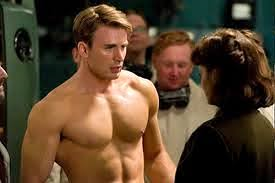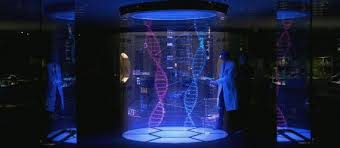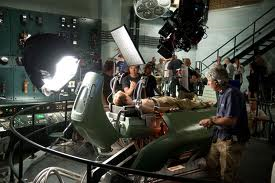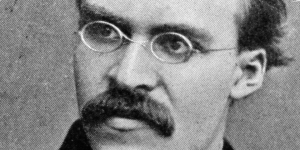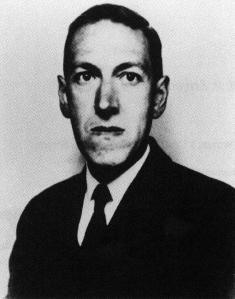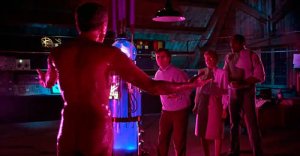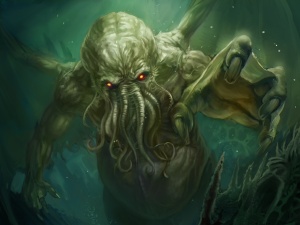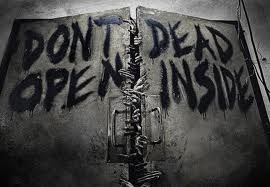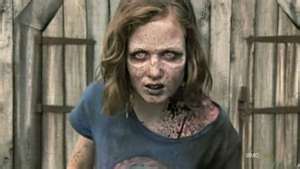SPOILER WARNING

Deconstructed Superheroes
Mythic heroes are supersized embodiments of a society’s highest values, and their struggles represent its deepest fears. One way or another those fears revolve around our anxieties about death and the problem of nihilism, the belief that life is devoid of intrinsic meaning and ultimately pointless. In The Denial of Death, anthropologist Ernest Becker said hero narratives are a kind of ‘psychological armor’ that generate:
- [A] feeling of primary value, of cosmic specialness, of ultimate usefulness to creation, of unshakable meaning…’an immunity bath’ from the greatest evil: death and the dread of it…Cultural illusion is a necessary ideology of self-justification, a heroic dimension that is life itself to the symbolic animal.
The emergence of multi-billion dollar superhero franchises over the last fifteen years, therefore, raises some interesting sociological and philosophical questions: what do these particular narratives say about Western culture’s most cherished beliefs? How do they reflect our fears and frustrations? This is what Alan Moore and David Gibbons explored nearly thirty years ago in their groundbreaking superhero comic Watchmen. Philosopher Iain Thomson says Watchmen deconstructs “the very idea of the hero, overloading and thereby shattering this idealized reflection of humanity and so encouraging us to reflect upon its significance from the many different angles of the shards left lying on the ground.”
 Watchmen is set in an alternate 1980s where the existence of superheroes, especially the Superman-like Dr. Manhattan, has resulted in an American victory in Vietnam, more terms in office for Nixon, and a clear strategic advantage in the Cold War. That is until Dr. Manhattan, fed up with humanity, decides to leave earth and live on Mars, thus escalating the threat of nuclear annihilation. The future of the human race looks pretty bleak. This set-up allows Moore to dramatize various reactions to death-anxiety and nihilism. Thomson says that, with Moore’s ironic heroes, “nihilism is a natural fall-back position. It is as if…since our values are not absolute, they must be relative—their absolutism having led them falsely to assume these alternatives to be exhaustive.”
Watchmen is set in an alternate 1980s where the existence of superheroes, especially the Superman-like Dr. Manhattan, has resulted in an American victory in Vietnam, more terms in office for Nixon, and a clear strategic advantage in the Cold War. That is until Dr. Manhattan, fed up with humanity, decides to leave earth and live on Mars, thus escalating the threat of nuclear annihilation. The future of the human race looks pretty bleak. This set-up allows Moore to dramatize various reactions to death-anxiety and nihilism. Thomson says that, with Moore’s ironic heroes, “nihilism is a natural fall-back position. It is as if…since our values are not absolute, they must be relative—their absolutism having led them falsely to assume these alternatives to be exhaustive.”
Variations on an all-or-nothing, extremist approach to nihilism are clearly expressed in The Comedian, Rorschach, and Ozzymandias. The Comedian believes life’s lack of intrinsic meaning renders the world absurd, a cosmic joke he chooses to parody with a cynical life-style ironically symbolized by his smiley face button. The Comedian pursues the American Dream by brutalizing, abusing, and killing—enjoying the carnage with a sense of glee, unconcerned with the impact it has on others—because, if the world is doomed to atomic conflagration, why worry? Be happy.
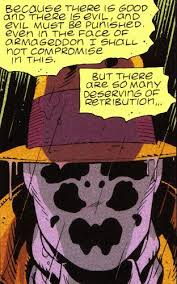 Rorschach agrees that the world is meaningless, but decides to double-down on the need for moral absolutes by taking it upon himself to impose them—vigilantly, violently, if necessary—on a street level, one criminal at a time. He is an extreme deontologist: immoral acts are never tolerable even if their long term consequences are desirable. He says evil “must be punished, in the face of Armageddon I will not compromise in this.” His harsh ethical code is symbolized by his mask: “Black and white. Moving. Changing shape…But not mixing. No gray.” Thomson says Rorschach embodies the modern world’s “deep fear that we are powerless to live up to our own ideals” as well as the “even deeper fear that these ideals themselves are mere projections with which we cover over and so conceal from ourselves ‘the real horror’” i.e. the universe’s utter indifference to our efforts to make it a purposeful place.
Rorschach agrees that the world is meaningless, but decides to double-down on the need for moral absolutes by taking it upon himself to impose them—vigilantly, violently, if necessary—on a street level, one criminal at a time. He is an extreme deontologist: immoral acts are never tolerable even if their long term consequences are desirable. He says evil “must be punished, in the face of Armageddon I will not compromise in this.” His harsh ethical code is symbolized by his mask: “Black and white. Moving. Changing shape…But not mixing. No gray.” Thomson says Rorschach embodies the modern world’s “deep fear that we are powerless to live up to our own ideals” as well as the “even deeper fear that these ideals themselves are mere projections with which we cover over and so conceal from ourselves ‘the real horror’” i.e. the universe’s utter indifference to our efforts to make it a purposeful place.
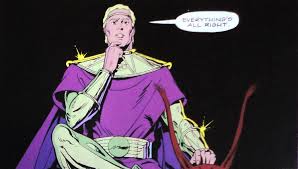
Ozzymandias
Ozzymandias is the most distorted version of Nietzsche’s Ubermensch solution to modern humanity’s existential crisis. He is willing to sacrifices millions of lives in order to save humanity. He has raised himself up to a level of such megalomaniacal self-importance that he no longer feels bound by any moral principle, save the cold utilitarian calculations he thinks necessary to humanity’s long term survival. In the end, Ozzymandias has become the most despicable character in a story full of monsters masquerading as heroes. He’s a genocidal fascist.
Dr. Manhattan represents the opposite strategy. Instead of ironic engagement, he chooses apathy and detachment. His superhuman status gives him a perspective on time and space that makes humanity’s problems seem so small and petty. He reduces the universe to a clock without a maker, an accidental enterprise with no end goal in mind. “A live body and a dead body contain the same number of particles,” he says. “Structurally, there is no discernible difference. Life and death are unquantifiable abstracts. Why should I be concerned?” Thomson argues that Dr. Manhattan embodies the scientific disenchantment of the world, “a world science takes to be intrinsically value-free, and so ultimately meaningless.”

Dr. Manhattan
And yet it is this very detachment and withdrawal that allows Dr. Manhattan to revise his nihilism and create new meanings. By helping Laurie re-evaluate her own existence, he comes to see each human as a “thermodynamic miracle.” The unique causal chain that culminated in the emergence of ‘Laurie,’ and every individual for that matter, is an event “with odds against so astronomical they’re effectively impossible.” Doc’s change of heart may reflect Moore’s underlying optimism about the scientific method: by dispelling the objective existence of divinities and spirits, science by definition disenchants the world, but, by relocating the supernatural in the imagination itself, a scientific worldview also opens up the possibility for new kinds of re-enchantment. We can still find miracles in the observable cosmos, especially in the most precious thing of all: the emergence of life itself. In this way, Dr. Manhattan represents a transhumanist perspective: once humans unravel the mysteries of how our own minds and bodies work, and thus transcend the very physiological limitations that shaped us, the challenge then lies in discovering a new life-affirming sense of wonder. Or what is the point?
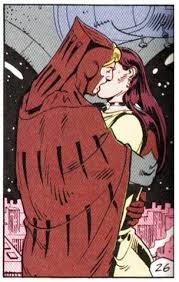
Dan and Laurie a.k.a. Nite Owl and Silk Specter II
For Dan and Laurie, the point is intimacy. While the other characters are on a Nietzschean quest to create superhuman values, Dan and Laurie turn to each other and take a Kierkegaardian leap of faith into the comfort of romantic love. The horrific aftermath of Ozzymandias’ genocidal plan makes Laurie find value not only in human life itself, as Dr. Manhattan helped her see, but in the beauty of the relationships those individuals can create. “Being alive is so damn sweet,” she tells Dan. “I want you to love me because we’re not dead.” Laurie and Dan’s new truth, their new purpose, is grounded in their commitment to each other, a self-sustaining source of order and meaning.
Now, lest one think he’s selling out his ironic ethos by embracing some lovey-dovey, hippified solution to the problem of nihlism, Moore undercuts the Kierkegaardian leap when Laurie says their love smells like “Nostalgia,” a reference to a perfume ad, so Moore is perhaps suggesting that the concept of romantic love is one more commodified myth we are persuaded to buy into, one more fiction we consume in hopes of filling the existential gaps before our time on this planet is up. But if Moore is as thoroughly postmodern as he appears to be, he’ll also acknowledge that ‘commidified myths’ and ‘consumable fictions’ are all we have, so why not buy into ‘love’?
Watchmen‘s deconstruction of superhero tropes twists the function of the text by interrogating its own readers. It asks: what are you really looking for in these panels? What patterns do you see in its words and images? Which ideas and values still resonate long after you’ve closed the book? This is how great art addresses the problem of nihilism, not by teaching us what life means, but by creatively representing the complexity of the issue and giving people the space to think and draw their own conclusions. Watchmen does what all good myths do: they tell stories that help us make sense of the world.










